Scottish Independence: Examining Referendum, Politics and Legislation
VerifiedAdded on 2022/12/23
|8
|1834
|99
Report
AI Summary
This report examines the multifaceted issue of Scottish independence, focusing on the political and legal aspects surrounding a potential second referendum. It begins with an overview of the UK's political structure, the role of the Scottish government, and the history of the independence movement, including the 2014 referendum. The core of the report investigates the powers of the Scottish Parliament, particularly its ability to legislate for another referendum, considering the constraints imposed by the Scotland Act of 1998 and the need for a Section 30 Order from Westminster. The report analyzes the First Minister's options, including a snap election, and the potential legislative hurdles. It also explores the legal interpretations of the Edinburgh Agreement and the arguments for and against the Scottish Parliament's authority to hold a referendum without Westminster's consent. The conclusion summarizes the key findings, emphasizing the complexities of the issue and the democratic rights of the Scottish people.
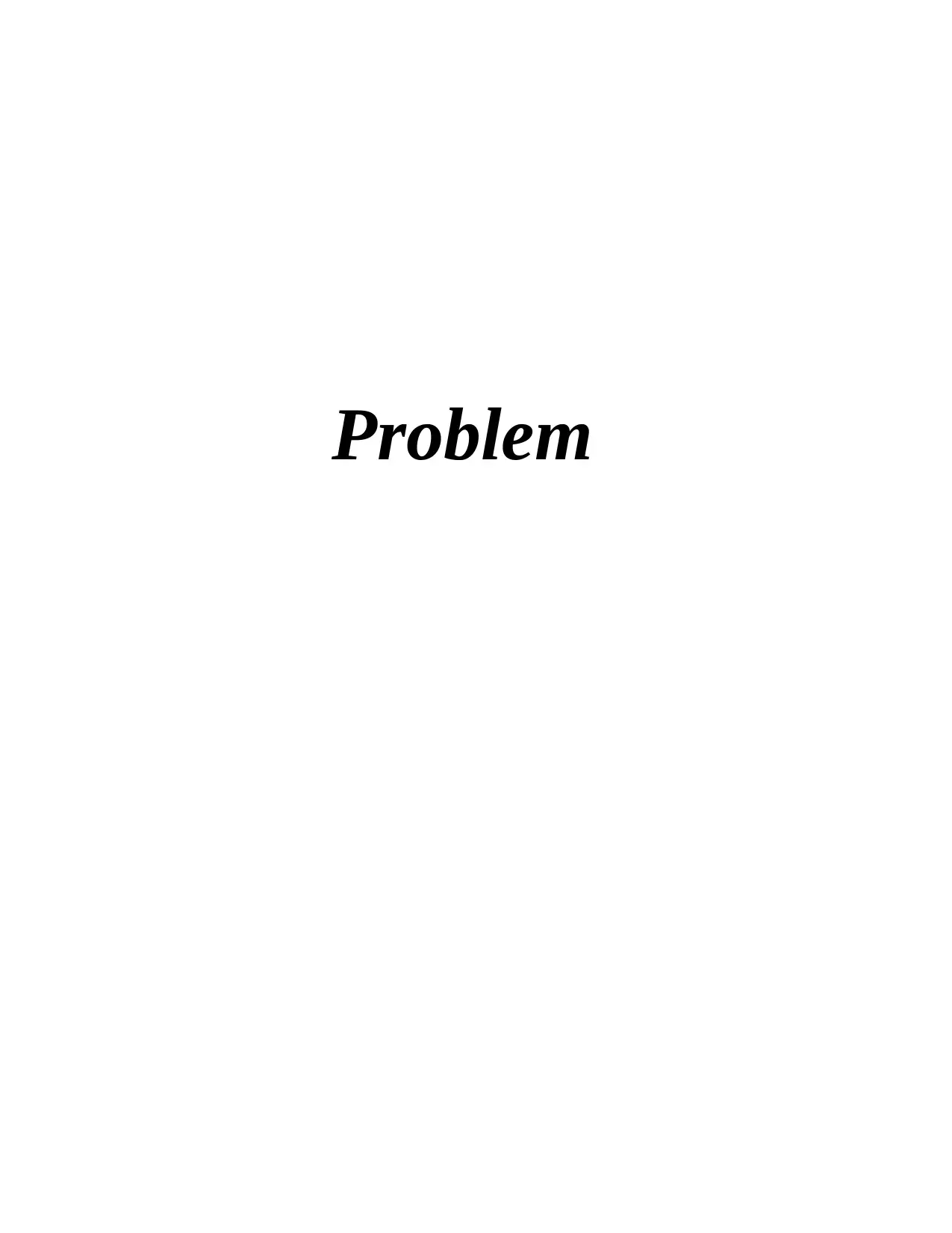
Problem
Paraphrase This Document
Need a fresh take? Get an instant paraphrase of this document with our AI Paraphraser
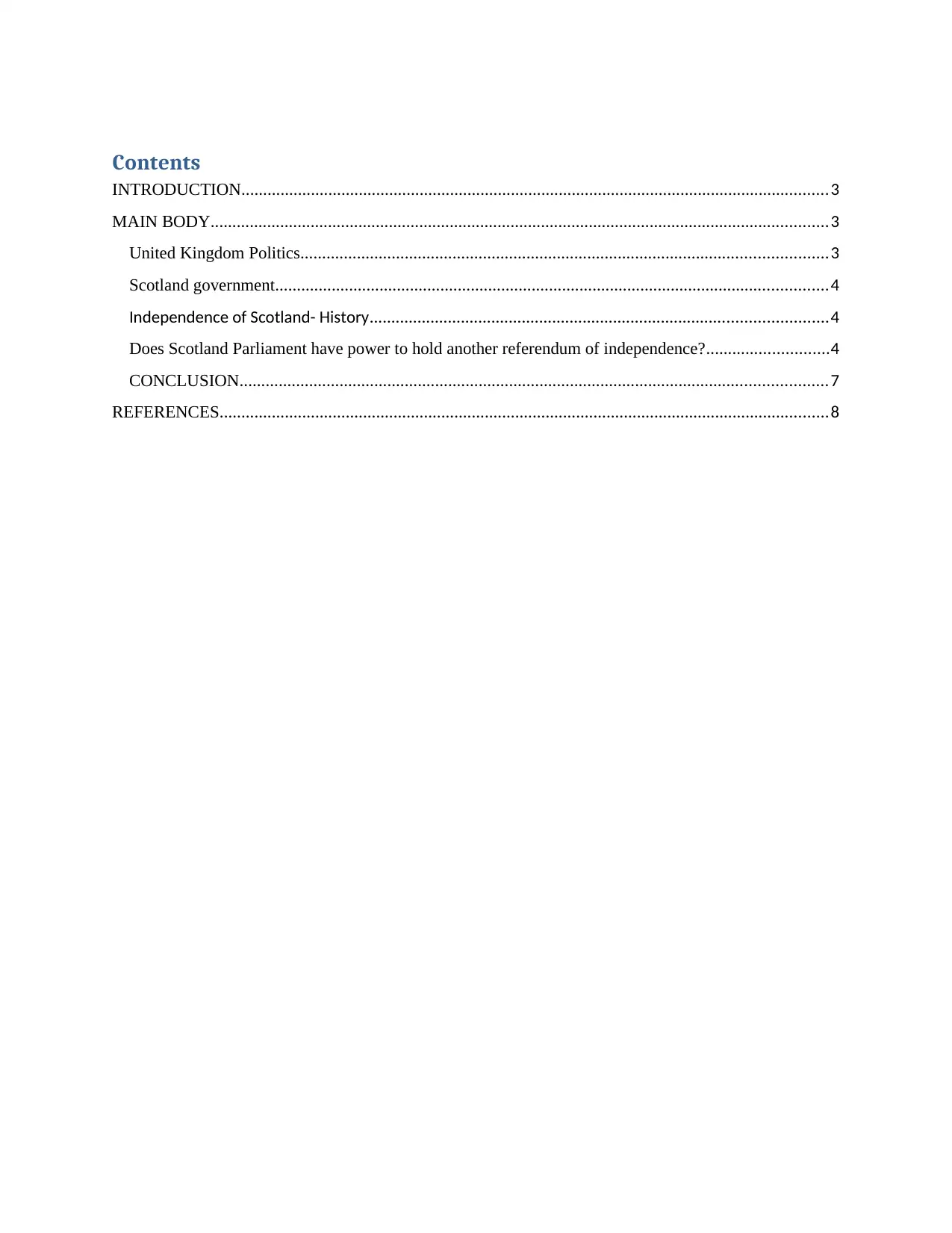
Contents
INTRODUCTION.......................................................................................................................................3
MAIN BODY..............................................................................................................................................3
United Kingdom Politics.........................................................................................................................3
Scotland government...............................................................................................................................4
Independence of Scotland- History.........................................................................................................4
Does Scotland Parliament have power to hold another referendum of independence?............................4
CONCLUSION.......................................................................................................................................7
REFERENCES............................................................................................................................................8
INTRODUCTION.......................................................................................................................................3
MAIN BODY..............................................................................................................................................3
United Kingdom Politics.........................................................................................................................3
Scotland government...............................................................................................................................4
Independence of Scotland- History.........................................................................................................4
Does Scotland Parliament have power to hold another referendum of independence?............................4
CONCLUSION.......................................................................................................................................7
REFERENCES............................................................................................................................................8
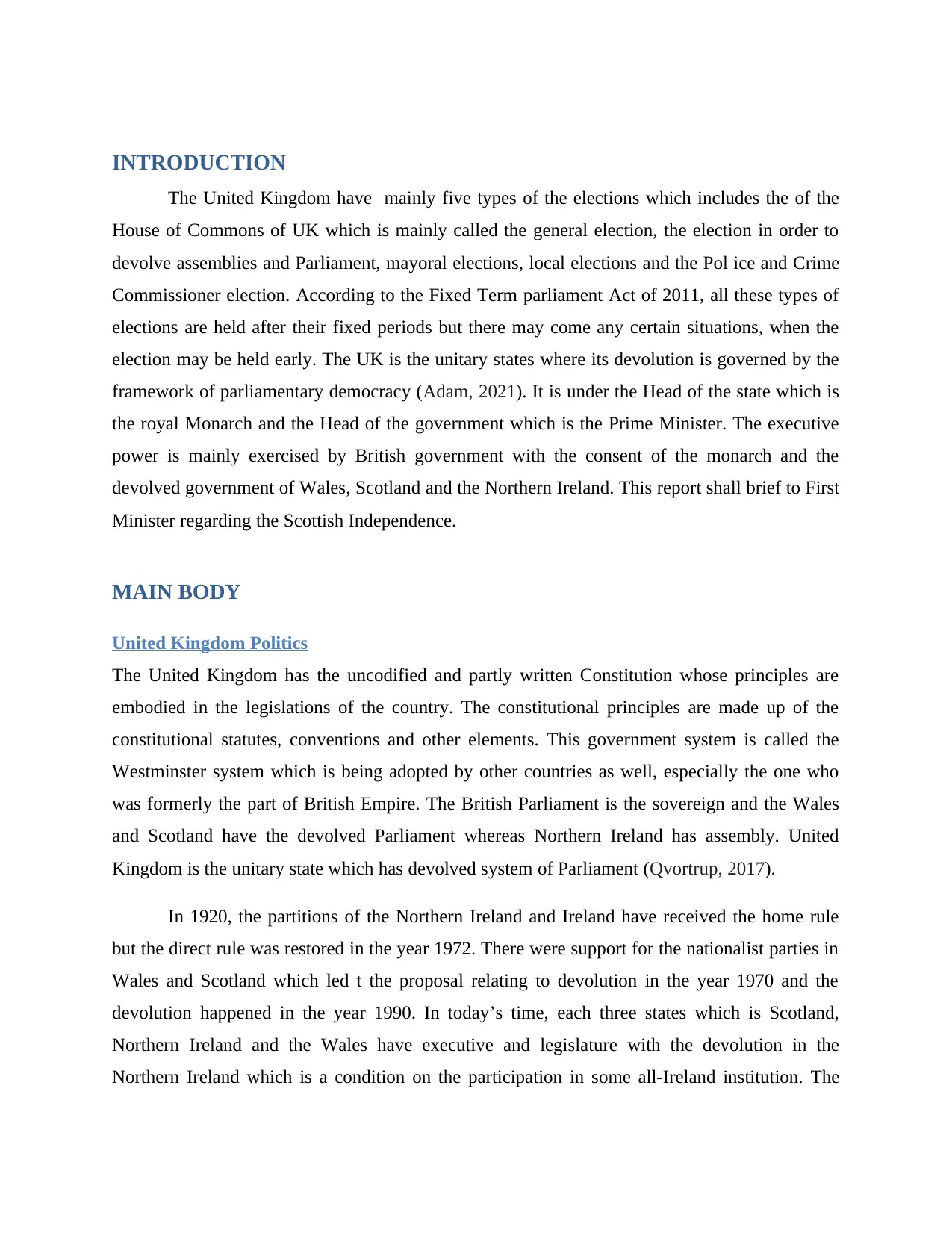
INTRODUCTION
The United Kingdom have mainly five types of the elections which includes the of the
House of Commons of UK which is mainly called the general election, the election in order to
devolve assemblies and Parliament, mayoral elections, local elections and the Pol ice and Crime
Commissioner election. According to the Fixed Term parliament Act of 2011, all these types of
elections are held after their fixed periods but there may come any certain situations, when the
election may be held early. The UK is the unitary states where its devolution is governed by the
framework of parliamentary democracy (Adam, 2021). It is under the Head of the state which is
the royal Monarch and the Head of the government which is the Prime Minister. The executive
power is mainly exercised by British government with the consent of the monarch and the
devolved government of Wales, Scotland and the Northern Ireland. This report shall brief to First
Minister regarding the Scottish Independence.
MAIN BODY
United Kingdom Politics
The United Kingdom has the uncodified and partly written Constitution whose principles are
embodied in the legislations of the country. The constitutional principles are made up of the
constitutional statutes, conventions and other elements. This government system is called the
Westminster system which is being adopted by other countries as well, especially the one who
was formerly the part of British Empire. The British Parliament is the sovereign and the Wales
and Scotland have the devolved Parliament whereas Northern Ireland has assembly. United
Kingdom is the unitary state which has devolved system of Parliament (Qvortrup, 2017).
In 1920, the partitions of the Northern Ireland and Ireland have received the home rule
but the direct rule was restored in the year 1972. There were support for the nationalist parties in
Wales and Scotland which led t the proposal relating to devolution in the year 1970 and the
devolution happened in the year 1990. In today’s time, each three states which is Scotland,
Northern Ireland and the Wales have executive and legislature with the devolution in the
Northern Ireland which is a condition on the participation in some all-Ireland institution. The
The United Kingdom have mainly five types of the elections which includes the of the
House of Commons of UK which is mainly called the general election, the election in order to
devolve assemblies and Parliament, mayoral elections, local elections and the Pol ice and Crime
Commissioner election. According to the Fixed Term parliament Act of 2011, all these types of
elections are held after their fixed periods but there may come any certain situations, when the
election may be held early. The UK is the unitary states where its devolution is governed by the
framework of parliamentary democracy (Adam, 2021). It is under the Head of the state which is
the royal Monarch and the Head of the government which is the Prime Minister. The executive
power is mainly exercised by British government with the consent of the monarch and the
devolved government of Wales, Scotland and the Northern Ireland. This report shall brief to First
Minister regarding the Scottish Independence.
MAIN BODY
United Kingdom Politics
The United Kingdom has the uncodified and partly written Constitution whose principles are
embodied in the legislations of the country. The constitutional principles are made up of the
constitutional statutes, conventions and other elements. This government system is called the
Westminster system which is being adopted by other countries as well, especially the one who
was formerly the part of British Empire. The British Parliament is the sovereign and the Wales
and Scotland have the devolved Parliament whereas Northern Ireland has assembly. United
Kingdom is the unitary state which has devolved system of Parliament (Qvortrup, 2017).
In 1920, the partitions of the Northern Ireland and Ireland have received the home rule
but the direct rule was restored in the year 1972. There were support for the nationalist parties in
Wales and Scotland which led t the proposal relating to devolution in the year 1970 and the
devolution happened in the year 1990. In today’s time, each three states which is Scotland,
Northern Ireland and the Wales have executive and legislature with the devolution in the
Northern Ireland which is a condition on the participation in some all-Ireland institution. The
⊘ This is a preview!⊘
Do you want full access?
Subscribe today to unlock all pages.

Trusted by 1+ million students worldwide
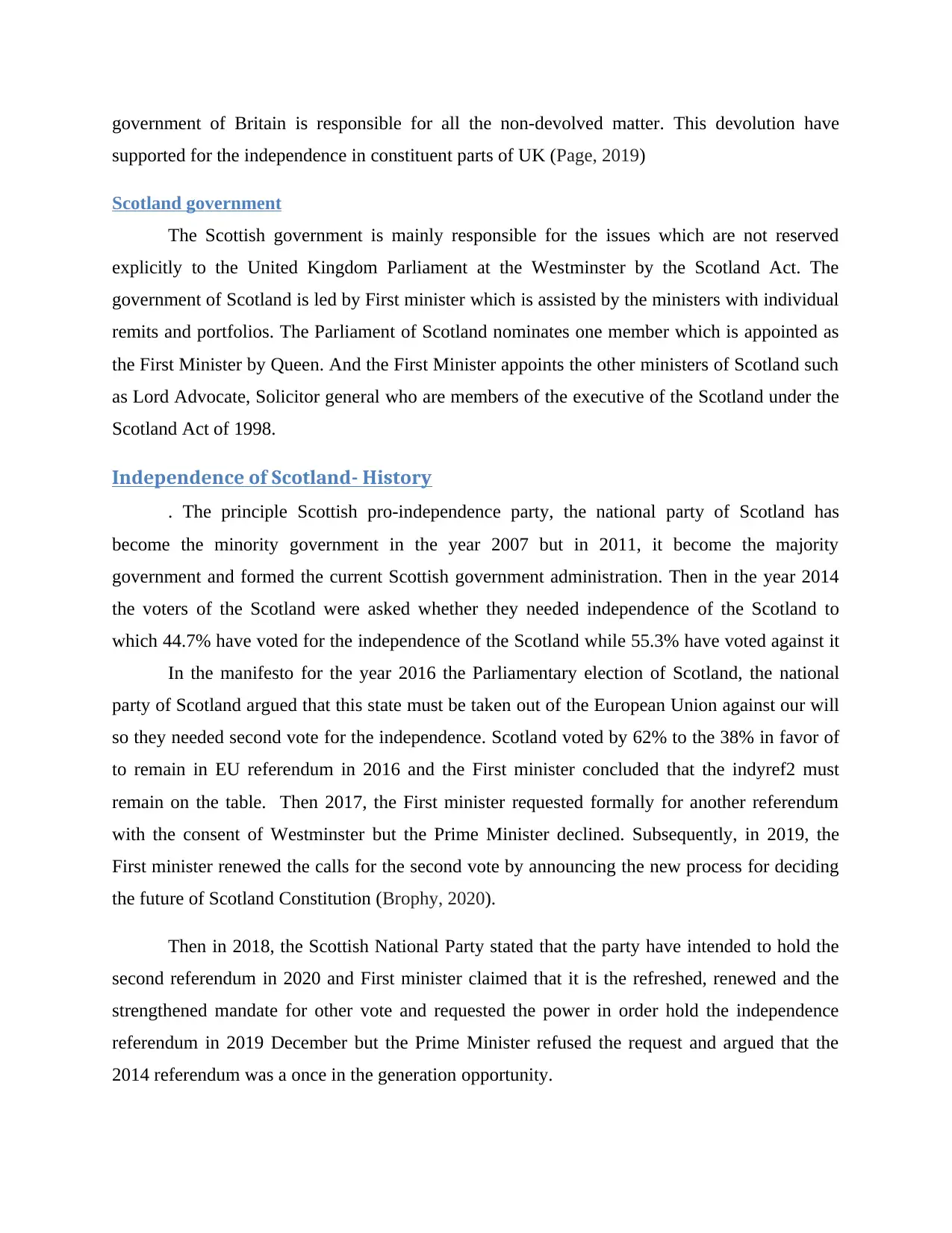
government of Britain is responsible for all the non-devolved matter. This devolution have
supported for the independence in constituent parts of UK (Page, 2019)
Scotland government
The Scottish government is mainly responsible for the issues which are not reserved
explicitly to the United Kingdom Parliament at the Westminster by the Scotland Act. The
government of Scotland is led by First minister which is assisted by the ministers with individual
remits and portfolios. The Parliament of Scotland nominates one member which is appointed as
the First Minister by Queen. And the First Minister appoints the other ministers of Scotland such
as Lord Advocate, Solicitor general who are members of the executive of the Scotland under the
Scotland Act of 1998.
Independence of Scotland- History
. The principle Scottish pro-independence party, the national party of Scotland has
become the minority government in the year 2007 but in 2011, it become the majority
government and formed the current Scottish government administration. Then in the year 2014
the voters of the Scotland were asked whether they needed independence of the Scotland to
which 44.7% have voted for the independence of the Scotland while 55.3% have voted against it
In the manifesto for the year 2016 the Parliamentary election of Scotland, the national
party of Scotland argued that this state must be taken out of the European Union against our will
so they needed second vote for the independence. Scotland voted by 62% to the 38% in favor of
to remain in EU referendum in 2016 and the First minister concluded that the indyref2 must
remain on the table. Then 2017, the First minister requested formally for another referendum
with the consent of Westminster but the Prime Minister declined. Subsequently, in 2019, the
First minister renewed the calls for the second vote by announcing the new process for deciding
the future of Scotland Constitution (Brophy, 2020).
Then in 2018, the Scottish National Party stated that the party have intended to hold the
second referendum in 2020 and First minister claimed that it is the refreshed, renewed and the
strengthened mandate for other vote and requested the power in order hold the independence
referendum in 2019 December but the Prime Minister refused the request and argued that the
2014 referendum was a once in the generation opportunity.
supported for the independence in constituent parts of UK (Page, 2019)
Scotland government
The Scottish government is mainly responsible for the issues which are not reserved
explicitly to the United Kingdom Parliament at the Westminster by the Scotland Act. The
government of Scotland is led by First minister which is assisted by the ministers with individual
remits and portfolios. The Parliament of Scotland nominates one member which is appointed as
the First Minister by Queen. And the First Minister appoints the other ministers of Scotland such
as Lord Advocate, Solicitor general who are members of the executive of the Scotland under the
Scotland Act of 1998.
Independence of Scotland- History
. The principle Scottish pro-independence party, the national party of Scotland has
become the minority government in the year 2007 but in 2011, it become the majority
government and formed the current Scottish government administration. Then in the year 2014
the voters of the Scotland were asked whether they needed independence of the Scotland to
which 44.7% have voted for the independence of the Scotland while 55.3% have voted against it
In the manifesto for the year 2016 the Parliamentary election of Scotland, the national
party of Scotland argued that this state must be taken out of the European Union against our will
so they needed second vote for the independence. Scotland voted by 62% to the 38% in favor of
to remain in EU referendum in 2016 and the First minister concluded that the indyref2 must
remain on the table. Then 2017, the First minister requested formally for another referendum
with the consent of Westminster but the Prime Minister declined. Subsequently, in 2019, the
First minister renewed the calls for the second vote by announcing the new process for deciding
the future of Scotland Constitution (Brophy, 2020).
Then in 2018, the Scottish National Party stated that the party have intended to hold the
second referendum in 2020 and First minister claimed that it is the refreshed, renewed and the
strengthened mandate for other vote and requested the power in order hold the independence
referendum in 2019 December but the Prime Minister refused the request and argued that the
2014 referendum was a once in the generation opportunity.
Paraphrase This Document
Need a fresh take? Get an instant paraphrase of this document with our AI Paraphraser
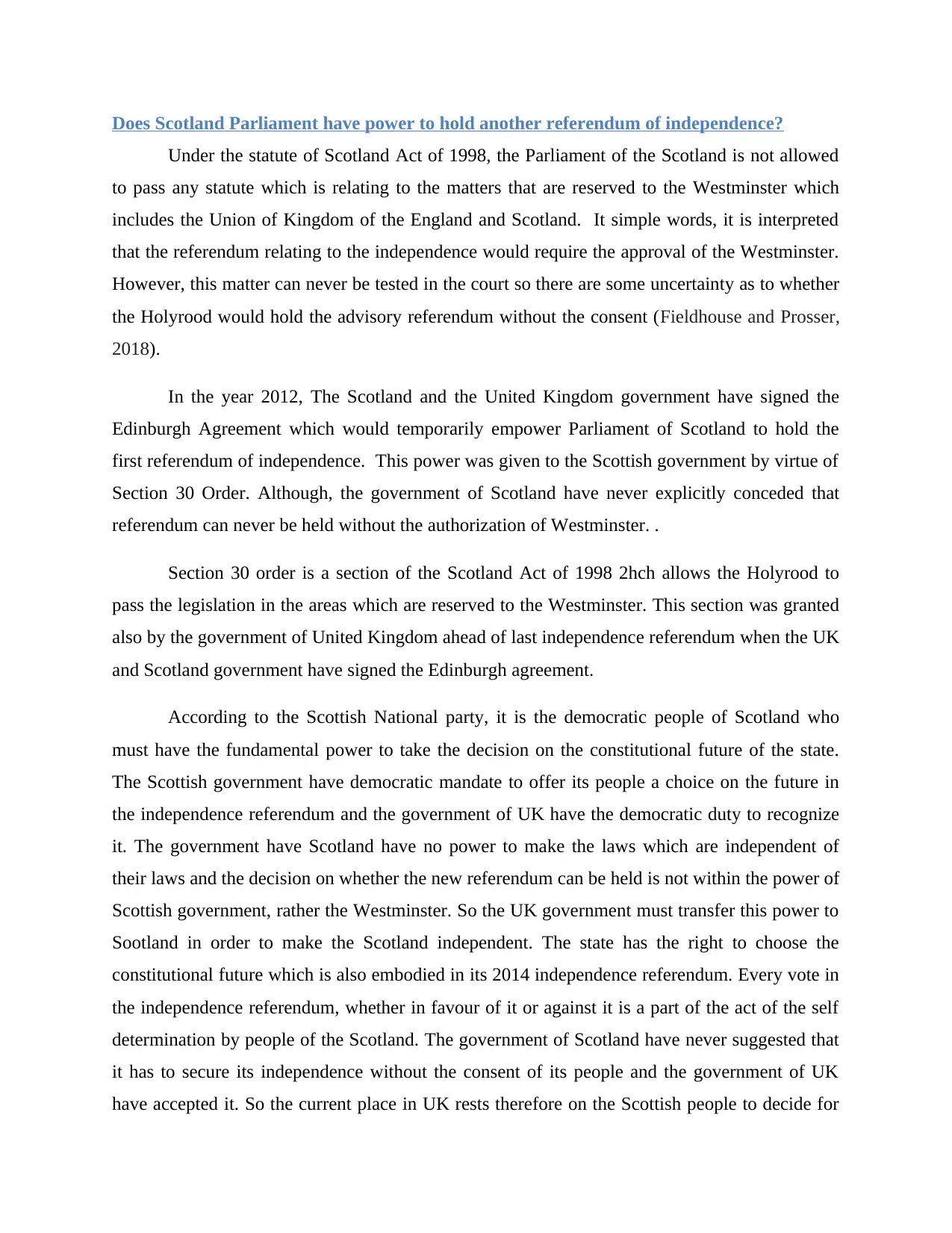
Does Scotland Parliament have power to hold another referendum of independence?
Under the statute of Scotland Act of 1998, the Parliament of the Scotland is not allowed
to pass any statute which is relating to the matters that are reserved to the Westminster which
includes the Union of Kingdom of the England and Scotland. It simple words, it is interpreted
that the referendum relating to the independence would require the approval of the Westminster.
However, this matter can never be tested in the court so there are some uncertainty as to whether
the Holyrood would hold the advisory referendum without the consent (Fieldhouse and Prosser,
2018).
In the year 2012, The Scotland and the United Kingdom government have signed the
Edinburgh Agreement which would temporarily empower Parliament of Scotland to hold the
first referendum of independence. This power was given to the Scottish government by virtue of
Section 30 Order. Although, the government of Scotland have never explicitly conceded that
referendum can never be held without the authorization of Westminster. .
Section 30 order is a section of the Scotland Act of 1998 2hch allows the Holyrood to
pass the legislation in the areas which are reserved to the Westminster. This section was granted
also by the government of United Kingdom ahead of last independence referendum when the UK
and Scotland government have signed the Edinburgh agreement.
According to the Scottish National party, it is the democratic people of Scotland who
must have the fundamental power to take the decision on the constitutional future of the state.
The Scottish government have democratic mandate to offer its people a choice on the future in
the independence referendum and the government of UK have the democratic duty to recognize
it. The government have Scotland have no power to make the laws which are independent of
their laws and the decision on whether the new referendum can be held is not within the power of
Scottish government, rather the Westminster. So the UK government must transfer this power to
Sootland in order to make the Scotland independent. The state has the right to choose the
constitutional future which is also embodied in its 2014 independence referendum. Every vote in
the independence referendum, whether in favour of it or against it is a part of the act of the self
determination by people of the Scotland. The government of Scotland have never suggested that
it has to secure its independence without the consent of its people and the government of UK
have accepted it. So the current place in UK rests therefore on the Scottish people to decide for
Under the statute of Scotland Act of 1998, the Parliament of the Scotland is not allowed
to pass any statute which is relating to the matters that are reserved to the Westminster which
includes the Union of Kingdom of the England and Scotland. It simple words, it is interpreted
that the referendum relating to the independence would require the approval of the Westminster.
However, this matter can never be tested in the court so there are some uncertainty as to whether
the Holyrood would hold the advisory referendum without the consent (Fieldhouse and Prosser,
2018).
In the year 2012, The Scotland and the United Kingdom government have signed the
Edinburgh Agreement which would temporarily empower Parliament of Scotland to hold the
first referendum of independence. This power was given to the Scottish government by virtue of
Section 30 Order. Although, the government of Scotland have never explicitly conceded that
referendum can never be held without the authorization of Westminster. .
Section 30 order is a section of the Scotland Act of 1998 2hch allows the Holyrood to
pass the legislation in the areas which are reserved to the Westminster. This section was granted
also by the government of United Kingdom ahead of last independence referendum when the UK
and Scotland government have signed the Edinburgh agreement.
According to the Scottish National party, it is the democratic people of Scotland who
must have the fundamental power to take the decision on the constitutional future of the state.
The Scottish government have democratic mandate to offer its people a choice on the future in
the independence referendum and the government of UK have the democratic duty to recognize
it. The government have Scotland have no power to make the laws which are independent of
their laws and the decision on whether the new referendum can be held is not within the power of
Scottish government, rather the Westminster. So the UK government must transfer this power to
Sootland in order to make the Scotland independent. The state has the right to choose the
constitutional future which is also embodied in its 2014 independence referendum. Every vote in
the independence referendum, whether in favour of it or against it is a part of the act of the self
determination by people of the Scotland. The government of Scotland have never suggested that
it has to secure its independence without the consent of its people and the government of UK
have accepted it. So the current place in UK rests therefore on the Scottish people to decide for
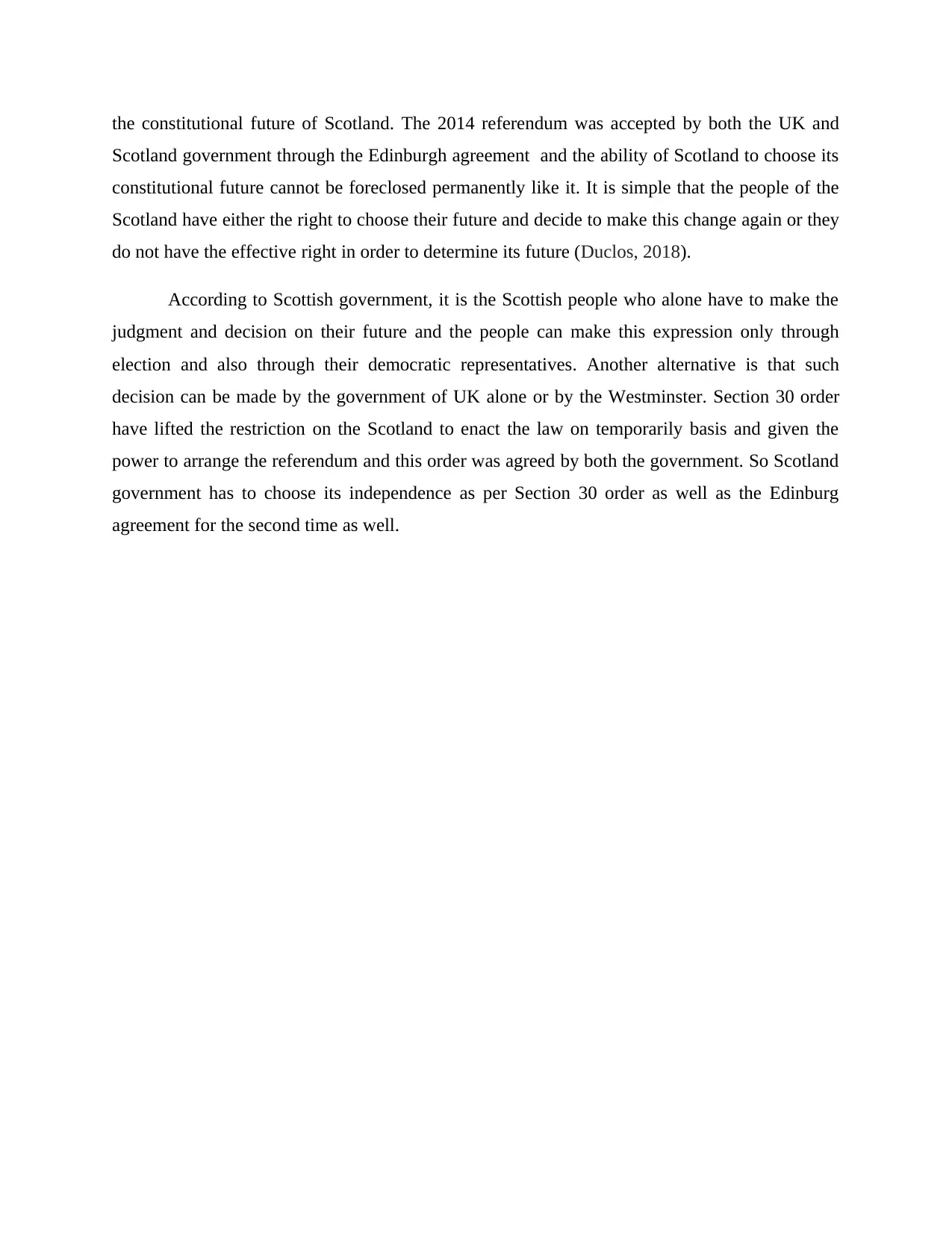
the constitutional future of Scotland. The 2014 referendum was accepted by both the UK and
Scotland government through the Edinburgh agreement and the ability of Scotland to choose its
constitutional future cannot be foreclosed permanently like it. It is simple that the people of the
Scotland have either the right to choose their future and decide to make this change again or they
do not have the effective right in order to determine its future (Duclos, 2018).
According to Scottish government, it is the Scottish people who alone have to make the
judgment and decision on their future and the people can make this expression only through
election and also through their democratic representatives. Another alternative is that such
decision can be made by the government of UK alone or by the Westminster. Section 30 order
have lifted the restriction on the Scotland to enact the law on temporarily basis and given the
power to arrange the referendum and this order was agreed by both the government. So Scotland
government has to choose its independence as per Section 30 order as well as the Edinburg
agreement for the second time as well.
Scotland government through the Edinburgh agreement and the ability of Scotland to choose its
constitutional future cannot be foreclosed permanently like it. It is simple that the people of the
Scotland have either the right to choose their future and decide to make this change again or they
do not have the effective right in order to determine its future (Duclos, 2018).
According to Scottish government, it is the Scottish people who alone have to make the
judgment and decision on their future and the people can make this expression only through
election and also through their democratic representatives. Another alternative is that such
decision can be made by the government of UK alone or by the Westminster. Section 30 order
have lifted the restriction on the Scotland to enact the law on temporarily basis and given the
power to arrange the referendum and this order was agreed by both the government. So Scotland
government has to choose its independence as per Section 30 order as well as the Edinburg
agreement for the second time as well.
⊘ This is a preview!⊘
Do you want full access?
Subscribe today to unlock all pages.

Trusted by 1+ million students worldwide
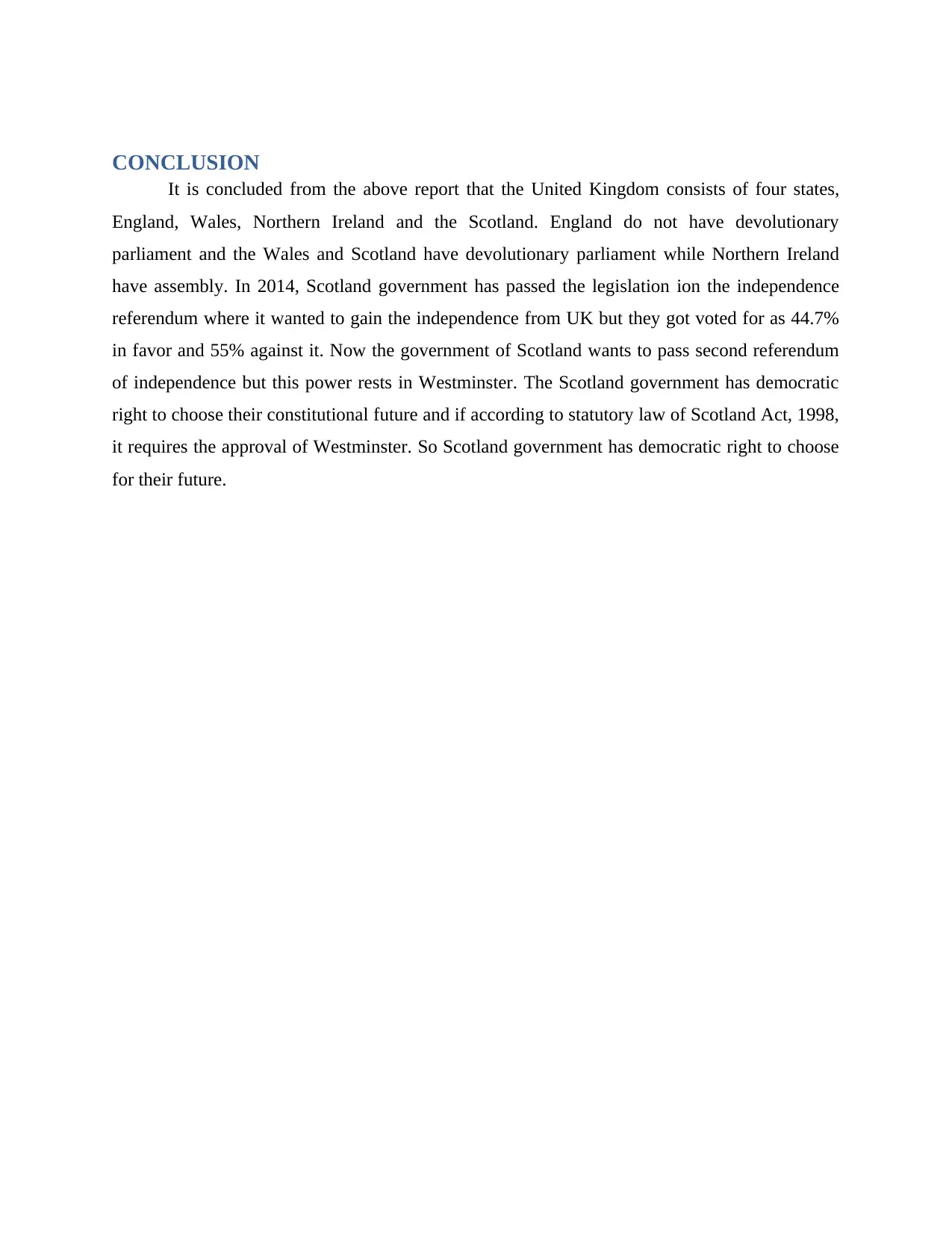
CONCLUSION
It is concluded from the above report that the United Kingdom consists of four states,
England, Wales, Northern Ireland and the Scotland. England do not have devolutionary
parliament and the Wales and Scotland have devolutionary parliament while Northern Ireland
have assembly. In 2014, Scotland government has passed the legislation ion the independence
referendum where it wanted to gain the independence from UK but they got voted for as 44.7%
in favor and 55% against it. Now the government of Scotland wants to pass second referendum
of independence but this power rests in Westminster. The Scotland government has democratic
right to choose their constitutional future and if according to statutory law of Scotland Act, 1998,
it requires the approval of Westminster. So Scotland government has democratic right to choose
for their future.
It is concluded from the above report that the United Kingdom consists of four states,
England, Wales, Northern Ireland and the Scotland. England do not have devolutionary
parliament and the Wales and Scotland have devolutionary parliament while Northern Ireland
have assembly. In 2014, Scotland government has passed the legislation ion the independence
referendum where it wanted to gain the independence from UK but they got voted for as 44.7%
in favor and 55% against it. Now the government of Scotland wants to pass second referendum
of independence but this power rests in Westminster. The Scotland government has democratic
right to choose their constitutional future and if according to statutory law of Scotland Act, 1998,
it requires the approval of Westminster. So Scotland government has democratic right to choose
for their future.
Paraphrase This Document
Need a fresh take? Get an instant paraphrase of this document with our AI Paraphraser
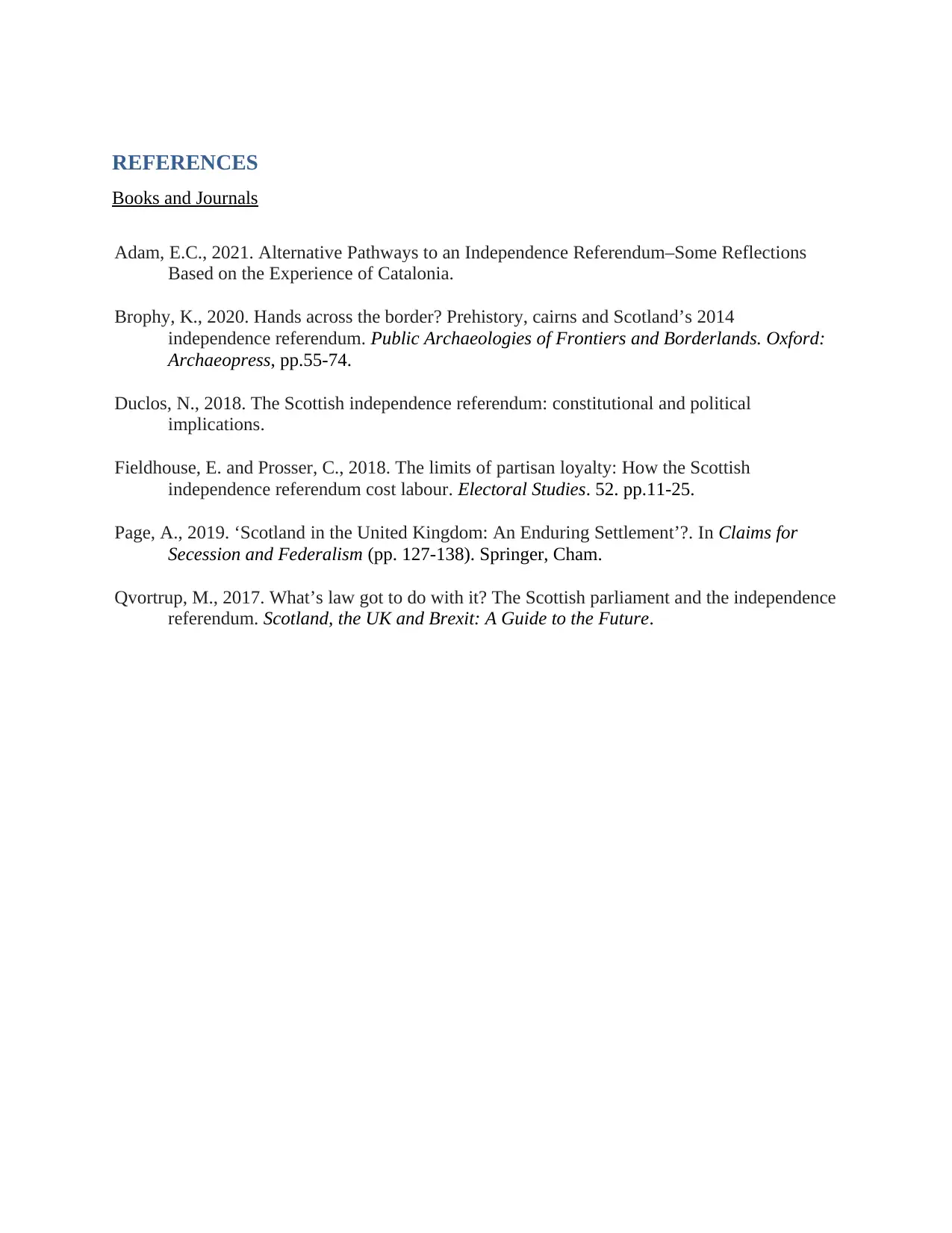
REFERENCES
Books and Journals
Adam, E.C., 2021. Alternative Pathways to an Independence Referendum–Some Reflections
Based on the Experience of Catalonia.
Brophy, K., 2020. Hands across the border? Prehistory, cairns and Scotland’s 2014
independence referendum. Public Archaeologies of Frontiers and Borderlands. Oxford:
Archaeopress, pp.55-74.
Duclos, N., 2018. The Scottish independence referendum: constitutional and political
implications.
Fieldhouse, E. and Prosser, C., 2018. The limits of partisan loyalty: How the Scottish
independence referendum cost labour. Electoral Studies. 52. pp.11-25.
Page, A., 2019. ‘Scotland in the United Kingdom: An Enduring Settlement’?. In Claims for
Secession and Federalism (pp. 127-138). Springer, Cham.
Qvortrup, M., 2017. What’s law got to do with it? The Scottish parliament and the independence
referendum. Scotland, the UK and Brexit: A Guide to the Future.
Books and Journals
Adam, E.C., 2021. Alternative Pathways to an Independence Referendum–Some Reflections
Based on the Experience of Catalonia.
Brophy, K., 2020. Hands across the border? Prehistory, cairns and Scotland’s 2014
independence referendum. Public Archaeologies of Frontiers and Borderlands. Oxford:
Archaeopress, pp.55-74.
Duclos, N., 2018. The Scottish independence referendum: constitutional and political
implications.
Fieldhouse, E. and Prosser, C., 2018. The limits of partisan loyalty: How the Scottish
independence referendum cost labour. Electoral Studies. 52. pp.11-25.
Page, A., 2019. ‘Scotland in the United Kingdom: An Enduring Settlement’?. In Claims for
Secession and Federalism (pp. 127-138). Springer, Cham.
Qvortrup, M., 2017. What’s law got to do with it? The Scottish parliament and the independence
referendum. Scotland, the UK and Brexit: A Guide to the Future.
1 out of 8
Related Documents
Your All-in-One AI-Powered Toolkit for Academic Success.
+13062052269
info@desklib.com
Available 24*7 on WhatsApp / Email
![[object Object]](/_next/static/media/star-bottom.7253800d.svg)
Unlock your academic potential
Copyright © 2020–2026 A2Z Services. All Rights Reserved. Developed and managed by ZUCOL.



